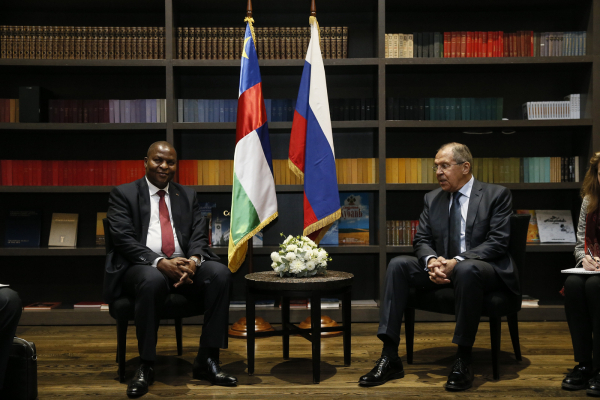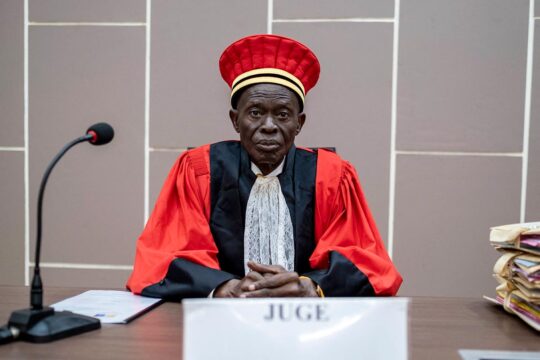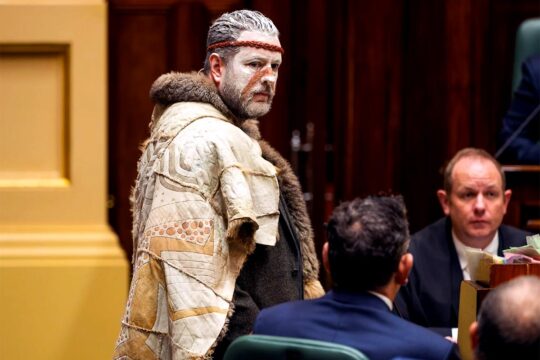Since the beginning of the year, Russian soldiers have become more and more visible in the Central African Republic, notably the capital Bangui, where some of them are now providing close protection for President Faustin Archange Touadera. To understand the real reasons and the possible implications of this Russian military presence in addition to the European Union military mission and the United Nations force, JusticeInfo spoke to French academic Didier Niewiadowski, a former professor of public law and former diplomat, notably in Bangui (2008-2012).
JusticeInfo: By calling on the Russian army, which is now advising the Central African Armed Forces (FACA) and giving them arms and munitions, is Touadera finally trying to get rid of the armed groups?
Didier Niewiadowski: By putting themselves under the umbrella of Russia and the screen of Russian private companies, President Touadera and his entourage want first of all to protect themselves against a coup d'etat and continue benefitting from their position. The improbable securing of the country is the task mainly of MINUSCA (UN mission in the CAR) and the process to bring the country out of crisis is defined in the African Union road map. But to preserve the status quo, the Central African president is setting multiple traps. The UN, the African Union and President Kagame (head of State of Rwanda, which is current chair of the African Union) are starting to learn this at their expense.
The current context suits the Russians well and they are unlikely to risk military operations against the rebel movements of the north-east, especially the Goula who are far from being their enemies. Their historical leader, former president Michel Djotodia, spent 14 years in Russia and he has again become a necessary party in the mediation attempts which are tending to cancel each other out and preserve the status quo. The recent aborted Russian mediation attempt in Khartoum shows that Russia’s role goes well beyond military advice and supplying arms but will not go as far as military confrontations, which would be highly risky, not only for the Russian soldiers but also for president Touadera, because it would break the status quo.
How have the armed groups reacted to this Russian presence, and doesn’t it risk endangering the current African mediation?
Whilst the official Russian line is that they want to re-establish the authority of the State and strengthen the capacities of FACA, on the ground the employees of private Russian companies often make deals with the rebel leaders. The ambivalence of the Russians mirrors that of the Central African authorities.
Russian companies, which have been present in Darfur for numerous years, have good relations with certain ethnic groups like the Goula and the Runga, who form the backbone of the Popular Front for Central African Renaissance (FPRC), the main rebel movement in the northeast which is hostile to the Touadera regime. On the other hand the Peulhs, especially those of the UPC (Union for Peace in the CAR) do not much appreciate the Russian involvement.
The African Union is disappointed with president Touadera’s behaviour. In private, those overseeing the Road Map regret the ambiguity of Touadera, who was absent from the pan-African Summit in Nouakchott on July 1-2, 2018, but who went to Lomé for the ECOWAS-ECCAS Summit on July 30. Russia’s eruption onto the Central African scene complicates the task of the African Union and the UN and hampers coordination of the different efforts, notably within the G5 (UN, African Union, European Union, United States, France).
Or do you think President Touadera thinks he can bypass European technical assistance in the military domain?
A decision of the European Council dated July 30, 2018, expands and extends the EU military mission to the CAR (EUTM-RCA) until September 19, 2020. As well as training the military, the EUTM-RCA will now provide strategic counselling to the Ministry of Defence and the Presidency on security matters. France is still the biggest contributor to this European operation with some 50 trainers out of a total of about 170 men. The growing Russian presence in the CAR seems now to be under surveillance, with the agreement of leaders of neighbouring countries. France is currently concerned mainly with Cameroon and the DRC as they approach elections that can have weighty consequences, including for the CAR.
What relations do these Russian soldiers have with the UN forces?
It doesn’t seem that there are relations of trust between the MINUSCA and EUTM-RCA soldiers and the Russian military instructors. And they are obviously non-existent with the Russian private security companies. Let us remember that for the end of Russian training ceremony on May 30 in Berengo, President Touadera, the government, top CAR military and Russian diplomats were in attendance for this high point of CAR-Russian cooperation. The French, American and European Union diplomats were not invited, whilst Western journalists were turned away.
How do Central Africans see this Russian military presence? Are the Russians seen as “saviours” by those who accuse the UN force of inaction?
Almost all Central Africans are fed up with MINUSCA. As well as performing well below their expectations, the behaviour of certain contingents, the allegations of smuggling in goods and even arms and the arrogance of some people in charge has seriously undermined the image of this operation to keep a peace that does not exist. On the other hand, the well-paid 12,000 UN peacekeepers help fuel the war economy in Bangui to the benefit of landlords, owners of hotels, restaurants and bars, and people in the import business. This artificial economy has little benefit for Central Africans in other parts of the country who continue to suffer. The arrival of the Russians is certainly hailed by supporters of President Touadera, but the Central African people are not stupid. They are hoping for national reconciliation, an end to impunity and the emergence of a new generation of leaders. The solution will come from Central Africans and not from foreigners, whoever they are.






